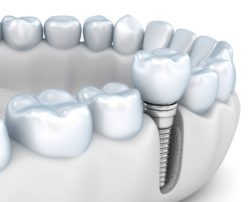Tooth loss affects millions of Americans, and missing teeth can leave you with gaps in your smile, impaired oral function, and further dental problems. Your dentist can help you replace lost teeth with restorative treatment. When you choose prosthetic teeth, you may want to consider a long-lasting, comprehensive option: dental implants.
Implants can restore your smile in the wake of tooth loss. But these fixtures will also address problems that can impact your jawbone when you lose one or more teeth. Read on to learn more about how tooth loss affects your jaw and how implant dentistry can prevent complications.

What Happens to the Jaw When You Lose a Tooth?
A healthy dental patient has a full set of teeth, each of them extending into a root below the gumline. The tooth root serves as stimulation for the jawbone, ensuring the bone remains strong and stable.
If you lose one or more teeth, the jaw no longer receives this stimulation from the tooth root. In its absence, the bone will begin to deteriorate. This can result in a sagging appearance in the face, teeth shifting out of position, and other oral health concerns.
You cannot stop this complication from occurring on your own. Your dentist can help you replace teeth with restorative treatment that will address issues with your jawbone too.
How Do Dental Implants Help Your Jawbone?
Dental implants feature a surgically placed titanium post anchor that fuses with the jawbone to provide support for prosthetic teeth. Whether you seek one, several, or a full arch of teeth replaced, your dentist can provide a type of implant that will suit your needs.
The anchor of the implant will replace the missing tooth root, providing stimulation to the jawbone once again. This will stop the bone from degenerating, preserving your facial and dental structure. It might also encourage lost jawbone to begin regrowing in some cases.
Other tooth replacements, like removable dentures, can replace teeth above the gumline, providing many dental advantages. But they will not address missing tooth roots and jawbone health. Consider this highly effective treatment option when you seek help from your dentist.
Can My Jaw Support Dental Implants?
Though the benefits of implant dentistry seem clear, not every patient can pursue this tooth replacement solution. Because the implants rely on the fusion of the fixture within the jaw, the patient must have enough healthy bone in the jaw to successfully receive this treatment.
If too much bone is already gone due to tooth loss, you might not qualify for dental implants. In this case, a dentist might suggest seeking a bone graft to build more structure within the jaw that will ultimately sustain the implant.
The dentist checks your jawbone health before proceeding with this treatment. This way, they can minimize your risk of the failure of these fixtures. They do this through x-ray imaging. Schedule a consultation with your dentist to learn if implant dentistry is the ideal tooth replacement solution for your unique smile.
